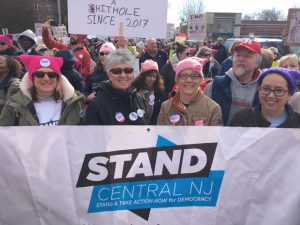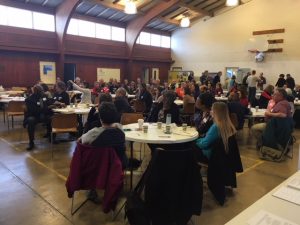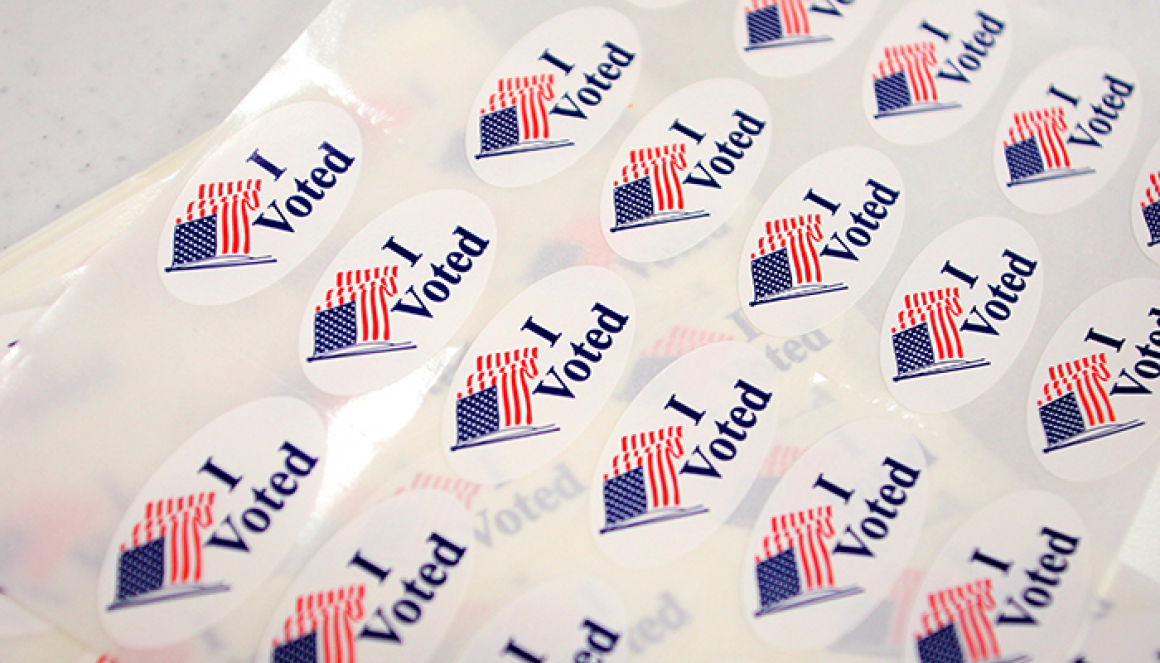Ready for 2018 After an Inspiring Weekend

It was a busy weekend for STAND CNJ and progressive Americans everywhere. On Saturday, more than a million people attended hundreds of Women’s Marches all over the country, in major cities and in smaller locales, in “blue”  states and in “red”. STAND CNJ was a proud sponsor of the Women’s March on NJ in Morristown, for which an unprecedented 15,000 to 20,000 people showed up!
states and in “red”. STAND CNJ was a proud sponsor of the Women’s March on NJ in Morristown, for which an unprecedented 15,000 to 20,000 people showed up!
What were these marches about? To paraphrase a sign we saw in Morristown, “Ugh, where do we start?!” In other words, we marched in order to express our opposition to the Trump administration’s year-long attack on civil rights, healthcare, tax fairness, LGBTQ rights, women’s rights, the environment, government transparency, the free press, the Mueller investigation, Muslims, immigrants, and people of color. Of particular concern this weekend was the #TrumpShutdown and the White House’s sudden abandonment of a bipartisan deal to protect DACA recipients from deportation. These pressing issues are a powerful reminder of just how vital it is to take our outrage and bring it to the 2018 mid-term elections. And that was the overarching message of this year’s Women’s Marches: bring your Power to the Polls! Showing up at marches won’t make a difference unless we also show up at our polling places and get our friends and neighbors to show up too.
To that end, in 2018, national Women’s March organizers aim to launch a voter registration tour of swing states and register 1 million voters nationwide, advocate for progressive policies, and help elect women and progressive candidates in the 2018 elections. This is an exciting goal, given that 2018 will see a record-shattering number of women candidates for all kinds of offices.
Sunday’s A Year of Resistance event reiterated the importance of the 2018 mid-terms. Organized by the Central Jersey Coalition for Justice, of which STAND CNJ is a proud member, the gathering brought local grassroots activists together  to look back on the year behind us and brainstorm for the year ahead. Keynote speaker Assemblyman Reed Gusciora (D-15) kindly stepped in and saved the day after it became clear that Rep. Bonnie Watson Coleman (D-12) was stuck in DC due to the #TrumpShutdown. Assemb. Gusciora emphasized the need for progressives to focus on this year’s midterm elections, and reminded us that “we all have to work…but we really can do it and make change all across America.” Gusciora also pointed out that after a year of progressive grassroots activism, four of New Jersey’s Republican-held congressional Districts (2,3,7,and 11) are now considered vulnerable! Said Gusciora, “I hope each of you will adopt one of those districts and help them out…and stay involved until November!”
to look back on the year behind us and brainstorm for the year ahead. Keynote speaker Assemblyman Reed Gusciora (D-15) kindly stepped in and saved the day after it became clear that Rep. Bonnie Watson Coleman (D-12) was stuck in DC due to the #TrumpShutdown. Assemb. Gusciora emphasized the need for progressives to focus on this year’s midterm elections, and reminded us that “we all have to work…but we really can do it and make change all across America.” Gusciora also pointed out that after a year of progressive grassroots activism, four of New Jersey’s Republican-held congressional Districts (2,3,7,and 11) are now considered vulnerable! Said Gusciora, “I hope each of you will adopt one of those districts and help them out…and stay involved until November!”

Assemblyman Reed Gusciora
In addition to this year’s congressional elections, there is also much that can finally be done at the state level here in New Jersey. With new governor Phil Murphy, Gusciora sees an opportunity to undo the damaging policies of the Christie administration, such as Christie’s 2016 veto of legislation that would have continued the Urban Economic Zone program. Also, New Jersey may finally be able to pass progressive legislation and actually get it signed into law! Gusciora spoke at length about the possibility of legalizing marijuana, which would bring in much-needed revenues and help to undo the school-to-prison pipeline.
2018 brings us the possibility of major change in New Jersey politics and in Congress. It’s more important than ever to regularly contact our governor and your state legislators. And this year, make a resolution to get involved in the 2018 mid-term elections: register people to vote, phone bank for a candidate, write postcards reminding voters about election day, donate money, host a fundraising dinner. No matter how little time or money you have, there are still ways for you to help increase voter turnout this November and elect progressive candidates. Bring your power to the polls!
The Six Reasons Why You Really Need to Vote Next Tuesday

New Jersey is one week away from electing a new governor and the entire state legislature on November 7th. Don’t even think about sitting this one out! Here’s why.

1. At the state and local level, YOUR VOTES MATTER! In years when only state and local seats are up for grabs, turnout has been terribly low in NJ, ranging from 40% in 2013, 32% in 2014, and an unbelievable 22% in 2015! This means that even a small increase in turnout can have a big impact! For example, state Assemblyman Andrew Zwicker won his seat in 2015 by only 76 votes. I’ve even heard of a race for local office that was tied at 62 votes each (62 votes!), and was decided by a coin toss. Your vote literally could be the difference between defeat and victory in a local- or state-level election. SO MAKE SURE YOU VOTE!
2. New Jersey’s governor gets to appoint the state Attorney General. “So what?”, you say. Not so fast! Attorneys General can bring the Trump administration to court over over its attempts to create travel bans, halt Obamacare subsidies, rescind DACA, and get rid of environmental regulations. Do you want to fight back against travel bans and fight for healthcare, environmental protection, and Dreamers? If your answer is “yes”, then you need to GET TO THE POLLS NEXT TUESDAY AND VOTE! Our next governor will appoint an Attorney General who could join with the 22 other AGs across the country who have been at the forefront of these fights in 2017.
3. There’s a chance that our next governor will get to appoint one of our U.S. Senators! Yes, you heard me right. One of our current senators, Bob Menendez (D) is in the middle of a corruption trial. If convicted, he is likely to be voted out of the Senate sometime next year. If that happens, the person who wins the governorship next Tuesday will get to appoint a replacement. Do you want to have some say about who represents you in the Senate? Do you want a Senator who will fight for progressive values? THEN YOU BETTER VOTE NEXT TUESDAY!
4. Your votes for local races can have a big impact on the issues that progressives care about. For example: If you’re concerned about the environment, you can elect town council members and mayors who support switching over to clean energy sources for municipal buildings. You can vote for local candidates who support stormwater run-off ordinances to protect local waters. IF YOU WANT TOWN COUNCIL MEMBERS LIKE THIS, YOU NEED TO ACTUALLY VOTE FOR THEM!
5. The whole country is watching what New Jersey will do on November 7th. We are one of only two states electing new governors this year (Virginia is the other one). All eyes are on NJ and VA as politicians begin to prepare for the vitally important mid-term elections of 2018. The way we vote next Tuesday will be a referendum on the damaging agenda coming out of DC. Do you care about what is happening in the federal government right now? If so, THEN SEND A CLEAR MESSAGE WITH YOUR VOTE!
6. When you don’t vote, you give power to your opponents. Eric Liu of Citizen University says it best: “There is no such thing as not voting. Not voting is voting — to hand power to others, whose interests may be inimical to your own.” USE YOUR POWER AND VOTE ON TUESDAY, NOVEMBER 7TH!
How Can We Fix NJ’s Broken Tax Code?

Panelists from three New Jersey organizations and STAND Central NJ gathered on Monday, October 1st, to describe the economic mess New Jersey is in, explain how we got there, and provide a blueprint for getting out of it! At the heart of the solution is changing New Jersey’s tax code, which has unfortunately redistributed billions of dollars to corporations and wealthy families over the last 8 years. For the new governor and state legislature taking office next year, repairing New Jersey’s budget and fixing our tax code is of the highest priority. But elected officials can’t do it alone — grassroots groups and citizens have a vital role to play.

L to R: Gordon McInnes; Dena Mottola Jaborska; Sheila Reynertson; Louis diPaolo; Olga Starr.
THE MESS
New Jersey’s economic woes are probably not news to you. Newspaper headlines and the daily lived experience of New Jerseyans constantly confirm their existence. NJ Transit is barely functional, college tuition costs never stop rising, property taxes are exorbitant, the state credit rating is the second lowest in the country, and the state fiscal health rating is the worst! Our state is now a jaw-dropping $10 billion in debt. And now, we find ourselves “on a collision course between years of reckless state budgets…and everything that’s happening at the federal level”, said panelist Louis diPaolo, legislative coordinator for NJ Working Families Alliance.

Gordon McInnes
And yet, the state of New Jersey has many advantages over other states, according to New Jersey Policy Perspective (NJPP) president, Gordon McInnes, another panelist. Our central location between New York City and Philadelphia is unique in the country, and attracts all those who work in the city, but don’t want to live there. New Jerseyans represent a highly trained workforce. Our schools are outstanding, second only to Massachusetts. Immigrants flock to our state and benefit the state economy. Over the last 10 years, New Jersey’s economy was worth $2.4 trillion. With all of these advantages, why is New Jersey in such bad shape?
WHO MADE THE MESS?
For the last 25 years, our state’s assets “have been ignored, underfunded and almost driven to ruin” by state tax cuts that have mostly benefited the wealthy, according to policy experts at NJPP. McInnes explained how a 30% cut in the state income tax (a tax which is supposed to exist to help reduce property taxes, as per our state constitution) has led to a loss of $10 billion which could have gone to property tax relief. At around the same time said McInnes, governors and other state leaders were discovering that state pension funds “make great ATMS.”
These economic maneuvers did not benefit all New Jerseyans equally. In fact, state budgets and tax cuts disproportionately prioritized the wealthiest corporations and families in the state, and not the average New Jerseyan. diPaolo and Sheila Reynertson, senior policy analyst at NJPP, gave two examples: 1) our income tax code is regressive, with New Jerseyans who make more than $750,000 a year actually paying at a lower rate than everyone else, and 2) last year’s inherited wealth tax cut benefited only the 100 wealthiest families in the state, but costs New Jersey $500 million a year! When the state legislature has tried to make our income tax brackets more equitable by raising the highest bracket rates, Gov. Christie has vetoed their legislation.
HOW TO CLEAN UP THE MESS

NJPP has a plan: a Blueprint for Economic Justice and Shared Prosperity. The crux of this plan is fixing the tax code so that the wealthy New Jerseyans who have benefitted the most from previous tax cuts will once again pay their fair share. This is especially important at a time like the present, when income inequality is on a steep rise and the state faces severe budget problems, said Reynertson. The Blueprint recommends raising revenue in four key areas: income taxes, the tax on inherited wealth, corporate taxes, and sales taxes.
- Income taxes: Raising tax rates only for the top 5% of NJ families would bring in over $1 billion a year.
- Inherited wealth tax: To restore $500 million a year to NJ’s budget, we need to restore the inherited wealth tax that was cut last year (a tax which affects only about 100 very wealthy families, or 1,000 very wealthy individuals).
- Get rid of last year’s sales tax cut, which costs the state $600 million a year, but only saves people between 9 cents and 55 cents a day! Says Reynertson: “It’s the tax cut that no one asked for!”
- Close corporate tax loopholes by transitioning to “combined reporting” for corporate taxes. This prevents large multi-state corporations who make money in New Jersey from paying taxes only in the state with the lowest (or even no!) corporate taxes. A switch to combined reporting would bring in about $290 million a year, and at the same time help smaller, local businesses compete.
Some people in the audience worried that raising tax revenue, especially on wealthy families and large corporations, would cause many wealthy families and businesses to leave New Jersey. Not so, said Reynertson. Research shows that a certain portion — approximately 10% — will leave, but most will stay in the location that made them wealthy in the first place. “We can afford to lose 10% when we’re gaining” revenue from 90% of those who are wealthy, she said. Similarly, the switch to “combined reporting” for corporate taxes is not expected to lead to businesses leaving NJ. Every state in the Northeast already uses combined reporting, and 92% of New Jersey’s businesses are already familiar with the practice, and consider it an ordinary part of doing business, Reynertson explained.
HOW CAN WE HELP?
Not suprisingly, NJPP’s revenue-raising suggestions are unpalatable to many current state legislators. And that’s where we come in. “We really are going to have to insist that [our new governor and state legislature] solve this problem,” said Dena Mottola Jaborska, associate director of New Jersey Citizen Action. “This…is really about courage.” Elected officials will need courage to advocate economic policies that put working families, and not the wealthy, first. The public gives them this courage when we speak out, contact our legislators and show up at rallies.

STAND CNJ’s Olga Starr
Grassroots activists needs courage too, as the road ahead is going to be hard. “We have very vested interests working against us,” said Jaborska. Wealthy corporations have a disproportionate share of power — and that is why we need as many citizens to act as possible. New Jerseyans need to hold their elected officials accountable, and pull in friends and neighbors to call, email, and meet with representatives. Organizing our friends and neighbors is as simple as one conversation at a time. STAND CNJ’s own Olga Starr described the power of talking to people about their values and concerns, the core component of STAND’s recent Voting our Values initiative. By connecting what happens in the statehouse with peoples’ values and concerns, we can turn apathetic citizens into active ones. Engaged citizens working together can counter the influence of money on unfair, regressive tax policy. As Jaborska said, “We have to build a movement around these [tax] issues.”
To that end, New Jersey Citizen Action is urging all citizens to get in touch with the candidates for governor and state legislature and ask them if they will support the following recommendations from NJPP’s Blueprint for Economic Justice & Shared Prosperity:
- closing corporate loopholes by implementing “combined reporting”
- reducing tax breaks to corporations
- raising $1 billion a year by increasing the tax rates for the wealthiest 5% of New Jerseyans
- raising $450 million a year by restoring the estate tax for the wealthiest 4% of estates
- legalizing and taxing marijuana
- raising more than $600 million a year by repealing the recent state sales tax cut
You can ask candidates about these ideas through a phone call, an email, a post on their FB or Twitter page, or a conversation at a campaign event. You can even ask them via a letter-to-the-editor of your local paper. Write down their answers, then send to dena@njcitizenaction.org or to New Jersey Citizen Action, 75 Raritan Ave, Suite 200, Highland Park, NJ.
Then, stay abreast of what is going on — and what grassroots activists and citizens need to do — by signing up for email alerts from New Jersey Citizen Action, New Jersey Policy Perspective or NJ Working Families. (or you can sign up with all three!)
If you would like to watch a recording of the “Fix NJ’s Broken Tax Code” panel, you can find it here.
